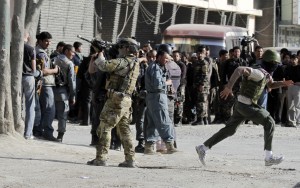Afghan president under lockdown in Kabul attacks—aide

A NATO soldier stands guard at the scene of an attack by Taliban militants in Kabul, Afghanistan, Sunday, April 15, 2012. The Taliban launched a series of coordinated attacks on at least seven sites across the Afghan capital on Sunday, targeting NATO headquarters, the parliament and diplomatic residences. Militants also launched near-simultaneous assaults in three other eastern cities. AP PHOTO/AHMAD JAMSHID
KABUL, Afghanistan—President Hamid Karzai was moved to a safe area and his palace went into lockdown as Kabul was hit Sunday by a wave of attacks including a failed attempt to target one of his deputies, officials said.
The embattled president was discussing the budget with a group of lawmakers when explosions and gunfire rocked three locations in the capital, including an upmarket diplomatic enclave close to his fortified palace, one of his aides said.
All his afternoon meetings, including one with a delegation of an insurgent group in Kabul for peace talks, were canceled, the official told AFP, requesting anonymity because of the sensitivity of the matter.
Additional bodyguards were deployed in the presidential palace and a meeting with a delegation of Hezb-i-Islami, an insurgent group led by former prime minister Gulbuddin Hekmatyar, now holding peace talks with Karzai was canceled, the aide said.
Insurgents armed with heavy machineguns, rocket-propelled grenade launchers and suicide vests launched what the Taliban spokesman said was a “coordinated attack” in Kabul and three eastern towns near the capital.
Article continues after this advertisementIn Kabul the insurgents took up positions in construction sites overlooking government buildings, diplomatic missions and other high-profile targets, unleashing a stand-off with security forces throughout the afternoon and evening.
Article continues after this advertisementLutfullah Mashal, a spokesman for the National Directorate of Security (NDS) the war-torn country’s intelligence agency, said that Mohammad Karim Khalili, one of Karzai’s two deputies was one of the targets of Sunday’s attacks.
Mashal said the group tasked with attacking Khalili’s home in west Kabul was captured before reaching their target.
“Two of them were (would-be) suicide bombers and another armed individual were captured. They were intending to attack the home of Mr Khalili. They were armed with suicide vests, guns and other explosives,” Mashal told AFP.
The spokesman said the group was linked to the Haqqani Network, a hardcore Taliban branch accused of masterminding most of the high-profile attacks in Kabul and other major cities. The group is also known to have close links to Al-Qaeda.